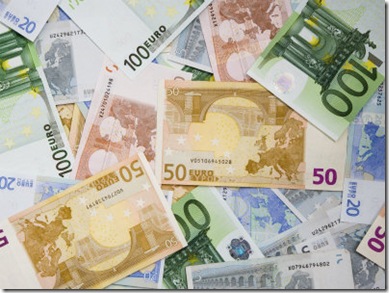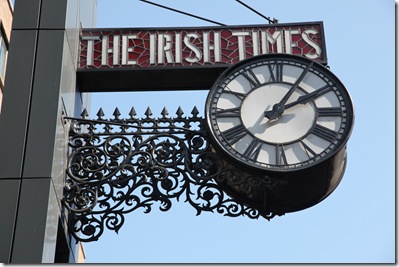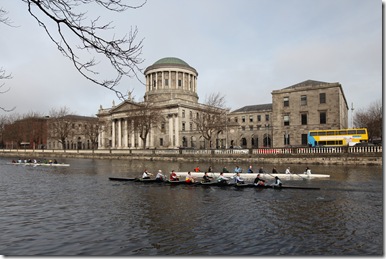President Obama spoke to an audience of 30,000 in College Green Dublin last Monday evening. It was a pleasant sunny evening and his remarks were greeted enthusiastically! This is a transcript:
THE PRESIDENT: Thank you! (Applause.) Hello, Dublin! (Applause.) Hello, Ireland! (Applause.) My name is Barack Obama -- (applause -- of the Moneygall Obamas. (Applause.) And I've come home to find the apostrophe that we lost somewhere along the way. (Laughter and applause.)
AUDIENCE MEMBER: I've got it here!
THE PRESIDENT: Is that where it is? (Laughter.)
Some wise Irish man or woman once said that broken Irish is better than clever English. (Applause.) So here goes: Tá áthas orm bheith in Éirinn -- I am happy to be in Ireland! (Applause.) I'm happy to be with so many á cairde. (Applause.)
I want to thank my extraordinary hosts -- first of all, Taoiseach Kenny -- (applause) -- his lovely wife, Fionnuala -- (applause) -- President McAleese and her husband, Martin -- (applause) -- for welcoming me earlier today. Thank you, Lord Mayor Gerry Breen and the Gardai for allowing me to crash this celebration. (Applause.)
Let me also express my condolences on the recent passing of former Taoiseach Garrett Fitzgerald -- (applause) -- someone who believed in the power of education, someone who believed in the potential of youth, most of all, someone who believed in the potential of peace and who lived to see that peace realized.
And most of all, thank you to the citizens of Dublin and the people of Ireland for the warm and generous hospitality you’ve shown me and Michelle. (Applause.) It certainly feels like 100,000 welcomes. (Applause.) We feel very much at home. I feel even more at home after that pint that I had. (Laughter.) Feel even warmer. (Laughter.)
In return let me offer the hearty greetings of tens of millions of Irish Americans who proudly trace their heritage to this small island. (Applause.) They say hello.
Now, I knew that I had some roots across the Atlantic, but until recently I could not unequivocally claim that I was one of those Irish Americans. But now if you believe the Corrigan Brothers, there’s no one more Irish than me. (Laughter and applause.)
So I want to thank the genealogists who traced my family tree.
AUDIENCE MEMBER: -- right here!
THE PRESIDENT: Right here? Thank you. (Applause.) It turns out that people take a lot of interest in you when you're running for President. (Laughter.) They look into your past. They check out your place of birth. (Laughter.) Things like that. (Laughter.) Now, I do wish somebody had provided me all this evidence earlier because it would have come in handy back when I was first running in my hometown of Chicago -- (applause) -- because Chicago is the Irish capital of the Midwest. (Applause.) A city where it was once said you could stand on 79th Street and hear the brogue of every county in Ireland. (Applause.)
So naturally a politician like me craved a slot in the St. Patrick’s Day parade. The problem was not many people knew me or could even pronounce my name. I told them it was a Gaelic name. They didn’t believe me. (Laughter.)
So one year a few volunteers and I did make it into the parade, but we were literally the last marchers. After two hours, finally it was our turn. And while we rode the route and we smiled and we waved, the city workers were right behind us cleaning up the garbage. (Laughter.) It was a little depressing. But I’ll bet those parade organizers are watching TV today and feeling kind of bad -- (applause) -- because this is a pretty good parade right here. (Applause.)
AUDIENCE MEMBER: Go Bulls!
PRESIDENT OBAMA: Go Bulls -- I like that. (Laughter.) We got some Bulls fans here.
Now, of course, an American doesn’t really require Irish blood to understand that ours is a proud, enduring, centuries-old relationship; that we are bound by history and friendship and shared values. And that’s why I’ve come here today, as an American President, to reaffirm those bonds of affection. (Applause.)
Earlier today Michelle and I visited Moneygall where we saw my ancestral home and dropped by the local pub. (Applause.) And we received a very warm welcome from all the people there, including my long-lost eighth cousin, Henry. (Laughter.) Henry now is affectionately known as Henry VIII. (Laughter.) And it was remarkable to see the small town where a young shoemaker named Falmouth Kearney, my great-great-great grandfather, my grandfather’s grandfather, lived his early life. And I was the shown the records from the parish recording his birth. And we saw the home where he lived.
And he left during the Great Hunger, as so many Irish did, to seek a new life in the New World. He traveled by ship to New York, where he entered himself into the records as a laborer. He married an American girl from Ohio. They settled in the Midwest. They started a family.
It’s a familiar story because it’s one lived and cherished by Americans of all backgrounds. It’s integral to our national identity. It’s who we are, a nation of immigrants from all around the world.
But standing there in Moneygall, I couldn’t help but think how heartbreaking it must have been for that great-great-great grandfather of mine, and so many others, to part. To watch Donegal coasts and Dingle cliffs recede. To leave behind all they knew in hopes that something better lay over the horizon.
When people like Falmouth boarded those ships, they often did so with no family, no friends, no money, nothing to sustain their journey but faith -- faith in the Almighty; faith in the idea of America; faith that it was a place where you could be prosperous, you could be free, you could think and talk and worship as you pleased, a place where you could make it if you tried.
And as they worked and struggled and sacrificed and sometimes experienced great discrimination, to build that better life for the next generation, they passed on that faith to their children and to their children’s children -- an inheritance that their great-great-great grandchildren like me still carry with them. We call it the America Dream. (Applause.)
It’s the dream that Falmouth Kearney was attracted to when he went to America. It’s the dream that drew my own father to America from a small village in Africa. It’s a dream that we’ve carried forward -- sometimes through stormy waters, sometimes at great cost -- for more than two centuries. And for my own sake, I’m grateful they made those journeys because if they hadn’t you’d be listening to somebody else speak right now. (Laughter.)
And for America’s sake, we’re grateful so many others from this land took that chance, as well. After all, never has a nation so small inspired so much in another. (Applause.)
Irish signatures are on our founding documents. Irish blood was spilled on our battlefields. Irish sweat built our great cities. Our spirit is eternally refreshed by Irish story and Irish song; our public life by the humor and heart and dedication of servants with names like Kennedy and Reagan, O’Neill and Moynihan. So you could say there’s always been a little green behind the red, white and blue. (Applause.)
When the father of our country, George Washington, needed an army, it was the fierce fighting of your sons that caused the British official to lament, “We have lost America through the Irish.” (Applause.) And as George Washington said himself, “When our friendless standards were first unfurled, who were the strangers who first mustered around our staff? And when it reeled in the light, who more brilliantly sustained it than Erin’s generous sons?”
When we strove to blot out the stain of slavery and advance the rights of man, we found common cause with your struggles against oppression. Frederick Douglass, an escaped slave and our great abolitionist, forged an unlikely friendship right here in Dublin with your great liberator, Daniel O’Connell. (Applause.) His time here, Frederick Douglass said, defined him not as a color but as a man. And it strengthened the non-violent campaign he would return home to wage.
Recently, some of their descendents met here in Dublin to commemorate and continue that friendship between Douglass and O’Connell.
When Abraham Lincoln struggled to preserve our young union, more than 100,000 Irish and Irish Americans joined the cause, with units like the Irish Brigade charging into battle -- green flags with gold harp waving alongside our star-spangled banner.
When depression gripped America, Ireland sent tens of thousands of packages of shamrocks to cheer up its countrymen, saying, “May the message of Erin shamrocks bring joy to those away.”
And when an Iron Curtain fell across this continent and our way of life was challenged, it was our first Irish President -- our first Catholic President, John F. Kennedy, who made us believe 50 years ago this week -- (applause) -- that mankind could do something big and bold and ambitious as walk on the moon. He made us dream again.
That is the story of America and Ireland. That’s the tale of our brawn and our blood, side by side, in making and remaking a nation, pulling it westward, pulling it skyward, moving it forward again and again and again. And that is our task again today.
I think we all realize that both of our nations have faced great trials in recent years, including recessions so severe that many of our people are still trying to fight their way out. And naturally our concern turns to our families, our friends and our neighbours. And some in this enormous audience are thinking about their own prospects and their own futures. Those of us who are parents wonder what it will mean for our children and young people like so many who are here today. Will you see the same progress we’ve seen since we were your age? Will you inherit futures as big and as bright as the ones that we inherited? Will your dreams remain alive in our time?
This nation has faced those questions before: When your land couldn’t feed those who tilled it; when the boats leaving these shores held some of your brightest minds; when brother fought against brother. Yours is a history frequently marked by the greatest of trials and the deepest of sorrow. But yours is also a history of proud and defiant endurance. Of a nation that kept alive the flame of knowledge in dark ages; that overcame occupation and outlived fallow fields; that triumphed over its Troubles –- of a resilient people who beat all the odds. (Applause.)
And, Ireland, as trying as these times are, I know our future is still as big and as bright as our children expect it to be. (Applause.) I know that because I know it is precisely in times like these –- in times of great challenge, in times of great change -– when we remember who we truly are. We’re people, the Irish and Americans, who never stop imagining a brighter future, even in bitter times. We’re people who make that future happen through hard work, and through sacrifice, through investing in those things that matter most, like family and community.
We remember, in the words made famous by one of your greatest poets that “in dreams begins responsibility.”
This is a nation that met that responsibility by choosing, like your ancestors did, to keep alight the flame of knowledge and invest in a world-class education for your young people. And today, Ireland’s youth, and those who’ve come back to build a new Ireland, are now among the best-educated, most entrepreneurial in the world. And I see those young people here today. And I know that Ireland will succeed. (Applause.)
This is a nation that met its responsibilities by choosing to apply the lessons of your own past to assume a heavier burden of responsibility on the world stage. And today, a people who once knew the pain of an empty stomach now feed those who hunger abroad. Ireland is working hand in hand with the United States to make sure that hungry mouths are fed around the world -- because we remember those times. We know what crippling poverty can be like, and we want to make sure we’re helping others.
You’re a people who modernized and can now stand up for those who can’t yet stand up for themselves. And this is a nation that met its responsibilities -– and inspired the entire world -– by choosing to see past the scars of violence and mistrust to forge a lasting peace on this island.
When President Clinton said on this very spot 15 years ago, waging peace is risky, I think those who were involved understood the risks they were taking. But you, the Irish people, persevered. And you cast your votes and you made your voices heard for that peace. (Applause.) And you responded heroically when it was challenged. And you did it because, as President McAleese has written, “For all the apparent intractability of our problems, the irrepressible human impulse to love kept nagging and nudging us towards reconciliation.”
Whenever peace is challenged, you will have to sustain that irrepressible impulse. And America will stand by you -- always. (Applause.) America will stand by you always in your pursuit of peace. (Applause.)
And, Ireland, you need to understand that you’ve already so surpassed the world’s highest hopes that what was notable about the Northern Ireland elections two weeks ago was that they came and went without much attention. It’s not because the world has forgotten. It’s because this once unlikely dream has become that most extraordinary thing of things: It has become real. A dream has turned to reality because of the work of this nation. (Applause.)
In dreams begin responsibility. And embracing that responsibility, working toward it, overcoming the cynics and the naysayers and those who say “you can’t” -- that’s what makes dreams real. That’s what Falmouth Kearney did when he got on that boat, and that’s what so many generations of Irish men and women have done here in this spectacular country. That is something we can point to and show our children, Irish and American alike. That is something we can teach them as they grow up together in a new century, side by side, as it has been since our beginnings.
This little country, that inspires the biggest things -- your best days are still ahead. (Applause.) Our greatest triumphs -- in America and Ireland alike -- are still to come. And, Ireland, if anyone ever says otherwise, if anybody ever tells you that your problems are too big, or your challenges are too great, that we can’t do something, that we shouldn’t even try -- think about all that we’ve done together. Remember that whatever hardships the winter may bring, springtime is always just around the corner. And if they keep on arguing with you, just respond with a simple creed: Is féidir linn. Yes, we can. Yes, we can. Is féidir linn. (Applause.)
For all you’ve contributed to the character of the United States of America and the spirit of the world, thank you. And may God bless the eternal friendship between our two great nations.
Thank you very much, everybody. Thank you, Dublin. Thank you, Ireland. (Applause.)
 When the €uro became the active currency of Ireland on 1 January 2003 the total value of the currency in circulation in the country was €2,897 million. Currency represented 3% of the nation’s money supply in 2003. Cash in circulation throughout the Eurozone has grown about 11% per annum since 2002
When the €uro became the active currency of Ireland on 1 January 2003 the total value of the currency in circulation in the country was €2,897 million. Currency represented 3% of the nation’s money supply in 2003. Cash in circulation throughout the Eurozone has grown about 11% per annum since 2002








